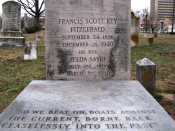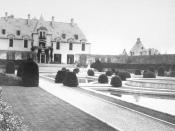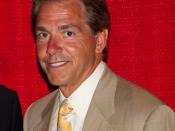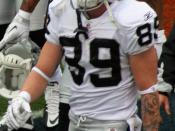The Great Gatsby- Character Studies By Aaron Francis What are the main Characters in The Great Gatsby? The two characters are Nick Caraway and Tom Buchanan. Nick tries to please everyone and is very moral, whereas Tom pleases himself, and is immoral.
At the start of the book, Nick is a typical American country boy. He believes that he always must be polite and considerate, as Nick says in p 7: he believes "a sense of the fundamental decencies is parcelled out unequally at birth [to everyone]"ÃÂ. He has a very high moral integrity, and believes that everyone else holds his values. Nick's attitude makes him naÃÂïve and vulnerable to those that would deceive him, or oppress him. Nick moves to West Egg with what he thinks is every Americans dream, presumably to make one's fortune, and start a family in the "ÃÂbig city', but Nick's dream is beaten down by Daisy, who gives Nick the wisdom of her experience as a country girl in the city, and Jordan, who shows Nick the city life.
Nick realises how oppressive Tom is subconsciously, but seems to see his old "ÃÂfriend' through rose-tinted glasses, saying on pp 12-13 " "Now don't think my opinion"æ is final"à[Tom] seemed to say "Just because I'm stronger and more of a man than you"ÃÂ."àThe quote shows Nick's understanding of Tom's arrogance, but Nick also says (p 13): "[Tom] wanted me to like him"ÃÂ. Only someone who had respect for the subject would think like that, because we make friends with people, who we think want to be our friends.
Nick never considered that infidelity existed, on page 20, Nick is very shocked when Jordan tells him that Tom has "got some woman in New York"ÃÂ, but later realises that, for Tom, it's actually less surprising than if "he had been depressed by a book"ÃÂ, another example of Nick's mixed feelings on Tom. Nick tries to have a strong character, although he can't stand up to Tom's ego, he doesn't let people bully him out of his morals, for example on page 24 when Daisy and Tom try to get him hitched, he says: "I had no intention of being rumoured into marriage"ÃÂ. As the book goes on, Nick begins to expect less of people, realising their moral failings exist, loosing some naivety, in the apartment block's garage, Nick asks Tom if his mistress' husband minds her going out with Tom, and when Tom says that the husband doesn't know, Nick accepts it, without questioning Tom. Daisy seems to foreshadow Nick's progress in the east; she came to the city with a dream, but was corrupted by the heart- and moral-less people. Gatsby protected Daisy, like he does Nick, but after Daisy left Gatsby, she fell victim to Tom, who doesn't seem to love her. This seems to be the fate set out for Nick.
Tom is a "ÃÂhulking' person, as Daisy describes him. Tom is well muscled, as it says that not even riding clothes could hide his musculation, with presumably, as he was a football player, broad shoulders, so he physically towers over others, but also his ego belittling others, which also serves to control them, i.e. They feel they have to give in to such a mentally strong person. Tom uses his physical prowess to control others: "wedging his tense arm imperatively under mine, Tom Buchanan compelled me from the room."ÃÂ Tom also uses his size to quell those that would undermine him "But Tom stopped her [Daisy] mid sentence by shifting heavily in his chair"ÃÂ. Tom feels very insecure, probably as a result from having his life peak in his early twenties, and tries to make up for, what he thinks are, his shortcomings. Tom has a big everything, the best, the most fancy, to put himself above others with wealth and power. Tom has a brand new sports car, from his mistress' husband. Tom has a grand "ÃÂGeorgian style colonial' house, with one side that is all French windows. Even Tom's physical size and massive ego, are just an outlet for Tom to secure himself with, by pushing others below him, rather than working towards a better self. Tom's insecurity leads him to be hypersensitive about things that threaten him. For example, on page 39,his mistress keeps shouting "ÃÂDaisy!' and "Making a short, deft movement, Tom Buchanan broke her nose with an open palm."ÃÂ Here, Mrs. Wilson is reminding Tom of his adultery, something that, although everybody knows about it, Tom ignorantly believes they don't and tries to protect the status quo.
Tom does not seem to be a very moral person, indeed with his history of adultery, illicit drinking and hitting women, we get the impression, at first, that he is the worst person imaginable. Throughout the book, Tom's morals are compared to Gatsby's morals, and we get the picture that Gatsby is a moral man, doing essentially evil things, and this image lends to the idea that Tom is also capable of being good, which is proved in the book. Tom's wealth is rightly his; he has legally earned it from being an American football player, whereas Gatsby sells alcohol. From this we see that Tom probably does have "the fundamental decencies"ÃÂ but that they have been corroded by his need to secure himself in the world. People like the McKee's Tom's morals are always testing Tom's morals, as Tom feels that he has to make a tough impression on them, which is part of his insecurity. Tom has two personas that we see in The Great Gatsby, the harsh, masochistic persona, feeding off of his lack of self-confidence and the persona that wants to help Nick, and loves Daisy. Nick acts as though Tom used to have the latter personality dominantly, but has moved towards the former.
From: The Great Gatsby, by F. Scott Fitzgerald 1926, published by Penguin





